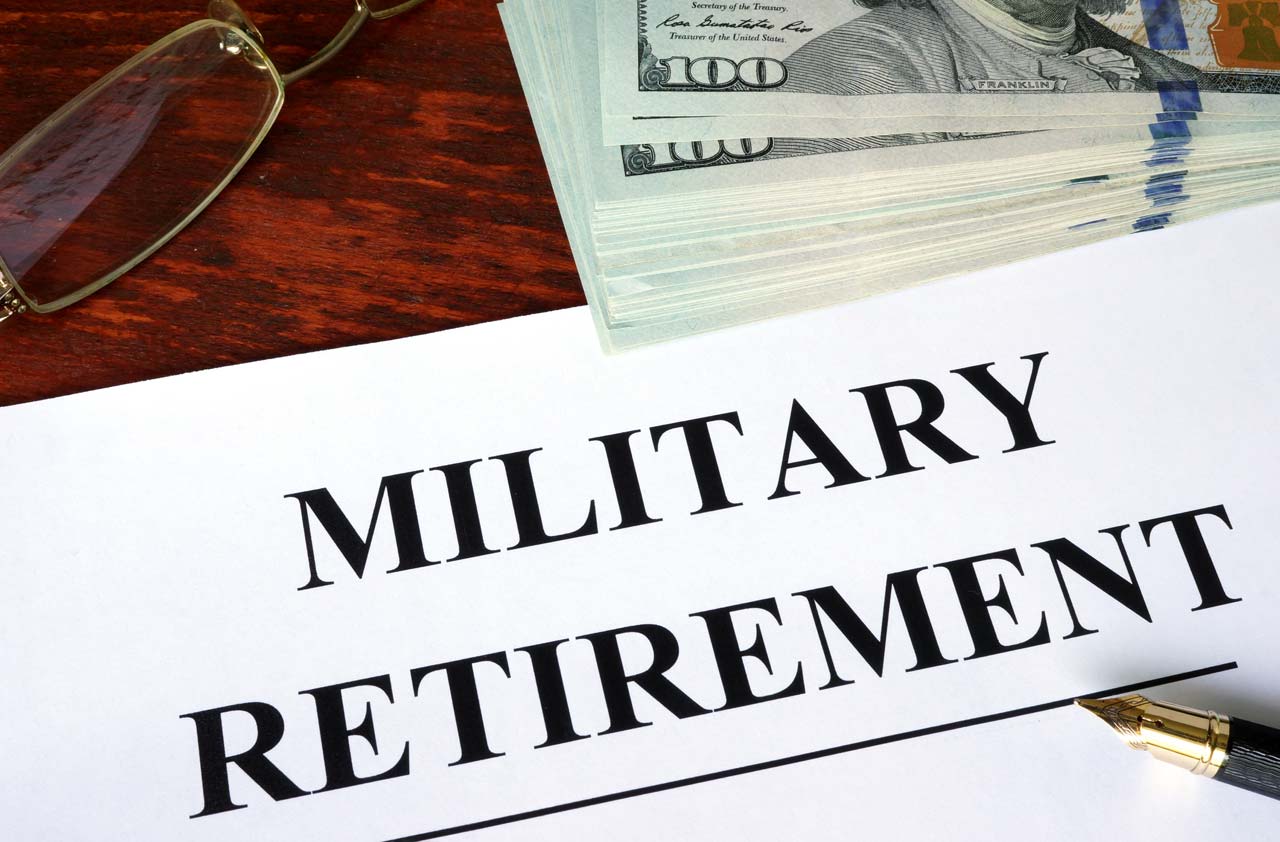When to Retire From the Army
Does a bigger pension make it worthwhile to stay in the Army for ten more years?


Profit and prosper with the best of Kiplinger's advice on investing, taxes, retirement, personal finance and much more. Delivered daily. Enter your email in the box and click Sign Me Up.
You are now subscribed
Your newsletter sign-up was successful
Want to add more newsletters?

Delivered daily
Kiplinger Today
Profit and prosper with the best of Kiplinger's advice on investing, taxes, retirement, personal finance and much more delivered daily. Smart money moves start here.

Sent five days a week
Kiplinger A Step Ahead
Get practical help to make better financial decisions in your everyday life, from spending to savings on top deals.

Delivered daily
Kiplinger Closing Bell
Get today's biggest financial and investing headlines delivered to your inbox every day the U.S. stock market is open.

Sent twice a week
Kiplinger Adviser Intel
Financial pros across the country share best practices and fresh tactics to preserve and grow your wealth.

Delivered weekly
Kiplinger Tax Tips
Trim your federal and state tax bills with practical tax-planning and tax-cutting strategies.

Sent twice a week
Kiplinger Retirement Tips
Your twice-a-week guide to planning and enjoying a financially secure and richly rewarding retirement

Sent bimonthly.
Kiplinger Adviser Angle
Insights for advisers, wealth managers and other financial professionals.

Sent twice a week
Kiplinger Investing Weekly
Your twice-a-week roundup of promising stocks, funds, companies and industries you should consider, ones you should avoid, and why.

Sent weekly for six weeks
Kiplinger Invest for Retirement
Your step-by-step six-part series on how to invest for retirement, from devising a successful strategy to exactly which investments to choose.
OUR READER
Who: Master Sgt. Jason Alexander, 35
Where: Alexandria, Va.
From just $107.88 $24.99 for Kiplinger Personal Finance
Become a smarter, better informed investor. Subscribe from just $107.88 $24.99, plus get up to 4 Special Issues

Sign up for Kiplinger’s Free Newsletters
Profit and prosper with the best of expert advice on investing, taxes, retirement, personal finance and more - straight to your e-mail.
Profit and prosper with the best of expert advice - straight to your e-mail.
Question: When should I retire from the Army?
For most of us, the advice to develop a retirement strategy three to five years in advance lets us wait until we're in our fifties. Not so if you're in uniform. Jason has served 16 years and is about to make a life-altering decision before he's 40: Should he quit the Army after 20 years, when he can qualify for retiree health care and a pension, or stay for 30 years and get a larger pension?
Jason says he loves the Army but wants to do what's best for his family financially. He works in administration at Fort Belvoir Community Hospital. Jason's wife, Allison, also 35, is a civilian federal employee. Their daughter, Anneliese, was born in April, and 10-year-old Kaitlyn, Jason's daughter from a previous marriage, lives nearby with her mother.
Uncertain future. The Alexanders' most pressing issue is that they don't know where their future lies, either geographically or professionally. As a master sergeant, Jason can be promoted only once more, so his pay won't rise much if he stays in the Army to get to 30 years.
To keep his options open, Jason earned an MBA online last year and is completing a master's in finance. If he works in finance, Jason thinks he would make more over a ten-year period than he would in the Army. But salary isn't everything. He needs to factor in his military benefits and tax breaks against what he'd qualify for in the private sector.
For example, Jason pays no state income taxes on his Army pay. (In the military, you can claim residence in a state where you served, such as income-tax-free Texas, even after you move to a state with income taxes.) He also gets a tax-free housing allowance of $2,600 per month.
Then there's the pension. If Jason leaves the Army after 20 years, he'll immediately get 50% of his base pay for life. For a master sergeant, that starts out as a monthly pension of $2,400 (plus annual inflation adjustments). But if Jason serves 30 years and gets promoted once more, financial planner Patrick Beagle estimates he would get about $31,000 more per year for life (in today's dollars) than if he were to duck out at 20 years.
So the pension side of the decision hinges on how big a pot of money Jason can build as a civilian using his MBA. Beagle, a former Marine helicopter pilot, estimates that Jason needs to save about $620,000 over ten years to take out 5% a year and offset the loss of the higher Army pension.
That could be a tall order. If he invested his 20-year pension for ten years and earned about 5% per year, he'd need to save about $1,600 more a month -- or $19,200 per year -- from his new job to make up the difference. Some of it could come from an employer match to a 401(k). But with two children, that might be pushing things. Then again, finance does offer a shot at higher pay and more promotions than being a master sergeant. The decision may ultimately boil down to how much risk Jason and his wife feel comfortable taking. "If you're not a risk-taker, the safe path is to stay with the government pension," says Beagle. "If you work for another employer, it puts the onus on you to amass that money."
Like to appear in Real Money? Write us at realmoney@kiplinger.com.
This article first appeared in Kiplinger's Personal Finance magazine. For more help with your personal finances and investments, please subscribe to the magazine. It might be the best investment you ever make.
Profit and prosper with the best of Kiplinger's advice on investing, taxes, retirement, personal finance and much more. Delivered daily. Enter your email in the box and click Sign Me Up.

As the "Ask Kim" columnist for Kiplinger's Personal Finance, Lankford receives hundreds of personal finance questions from readers every month. She is the author of Rescue Your Financial Life (McGraw-Hill, 2003), The Insurance Maze: How You Can Save Money on Insurance -- and Still Get the Coverage You Need (Kaplan, 2006), Kiplinger's Ask Kim for Money Smart Solutions (Kaplan, 2007) and The Kiplinger/BBB Personal Finance Guide for Military Families. She is frequently featured as a financial expert on television and radio, including NBC's Today Show, CNN, CNBC and National Public Radio.
-
 Dow Adds 1,206 Points to Top 50,000: Stock Market Today
Dow Adds 1,206 Points to Top 50,000: Stock Market TodayThe S&P 500 and Nasdaq also had strong finishes to a volatile week, with beaten-down tech stocks outperforming.
-
 Ask the Tax Editor: Federal Income Tax Deductions
Ask the Tax Editor: Federal Income Tax DeductionsAsk the Editor In this week's Ask the Editor Q&A, Joy Taylor answers questions on federal income tax deductions
-
 States With No-Fault Car Insurance Laws (and How No-Fault Car Insurance Works)
States With No-Fault Car Insurance Laws (and How No-Fault Car Insurance Works)A breakdown of the confusing rules around no-fault car insurance in every state where it exists.
-
 9 Types of Insurance You Probably Don't Need
9 Types of Insurance You Probably Don't NeedFinancial Planning If you're paying for these types of insurance, you may be wasting your money. Here's what you need to know.
-
 Three Veterans Charities to Support As Charitable Season Starts
Three Veterans Charities to Support As Charitable Season StartsIf you're looking for a worthwhile cause to support for Veterans Day and beyond, consider these three highly rated charities that support veterans and their families.
-
 Amazon Resale: Where Amazon Prime Returns Become Your Online Bargains
Amazon Resale: Where Amazon Prime Returns Become Your Online BargainsFeature Amazon Resale products may have some imperfections, but that often leads to wildly discounted prices.
-
 457 Plan Contribution Limits for 2026
457 Plan Contribution Limits for 2026Retirement plans There are higher 457 plan contribution limits in 2026. That's good news for state and local government employees.
-
 Medicare Basics: 12 Things You Need to Know
Medicare Basics: 12 Things You Need to KnowMedicare There's Medicare Part A, Part B, Part D, Medigap plans, Medicare Advantage plans and so on. We sort out the confusion about signing up for Medicare — and much more.
-
 The Seven Worst Assets to Leave Your Kids or Grandkids
The Seven Worst Assets to Leave Your Kids or Grandkidsinheritance Leaving these assets to your loved ones may be more trouble than it’s worth. Here's how to avoid adding to their grief after you're gone.
-
 SEP IRA Contribution Limits for 2026
SEP IRA Contribution Limits for 2026SEP IRA A good option for small business owners, SEP IRAs allow individual annual contributions of as much as $70,000 in 2025, and up to $72,000 in 2026.
-
 Roth IRA Contribution Limits for 2026
Roth IRA Contribution Limits for 2026Roth IRAs Roth IRAs allow you to save for retirement with after-tax dollars while you're working, and then withdraw those contributions and earnings tax-free when you retire. Here's a look at 2026 limits and income-based phaseouts.